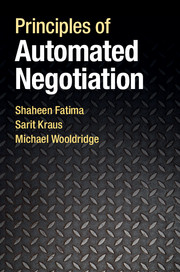Book contents
- Frontmatter
- Dedication
- Contents
- List of illustrations
- Preface
- Acknowledgements
- Summary of key notation
- 1 Introduction
- 2 Games in normal form
- 3 Games in extensive form
- 4 Negotiation domains
- 5 Strategic analysis of single-issue negotiation
- 6 Strategic analysis of multi-issue negotiation
- 7 The negotiation agenda
- 8 Multilateral negotiations
- 9 Heuristic approaches
- 10 Man–machine negotiations
- 11 Axiomatic analysis of negotiation
- 12 Applications
- 13 Related topics
- 14 Concluding remarks
- Appendix A Proofs
- References
- Index
8 - Multilateral negotiations
Published online by Cambridge University Press: 05 November 2014
- Frontmatter
- Dedication
- Contents
- List of illustrations
- Preface
- Acknowledgements
- Summary of key notation
- 1 Introduction
- 2 Games in normal form
- 3 Games in extensive form
- 4 Negotiation domains
- 5 Strategic analysis of single-issue negotiation
- 6 Strategic analysis of multi-issue negotiation
- 7 The negotiation agenda
- 8 Multilateral negotiations
- 9 Heuristic approaches
- 10 Man–machine negotiations
- 11 Axiomatic analysis of negotiation
- 12 Applications
- 13 Related topics
- 14 Concluding remarks
- Appendix A Proofs
- References
- Index
Summary
So far in this book, we have been focusing on bilateral (i.e., one-to-one) negotiations. One can easily imagine situations where more than two agents might need to negotiate with one another. For example, in a typical trading scenario, a seller might want to negotiate with multiple potential buyers. For such scenarios, we need multilateral negotiation protocols, that is protocols allowing one-to-many and many-to-many negotiations. In this chapter, we introduce a number of such protocols.
8.1 Alternating offers protocol with multiple bargainers
Consider the following many-to-many negotiation scenario. A group of two or more agents are together able to jointly produce a surplus, that is some joint gains. However, no subset of the group is able to do this. For example, say we have a group of five musicians that come together and create a piece of music that no subset could produce. By selling their music, they make a joint profit of £500,000. The key question here is “how should the joint gains be split between the individuals?”. We can think of the joint gains as a pie of unit size. The individuals must decide how they will divide the pie between themselves. An agreement requires the approval of all the players; no subset is allowed to reach an agreement.
Since there are more than two agents, we cannot use the alternating offers protocol described in Chapter 5. The protocol must be extended to deal with multiple players.
Information
- Type
- Chapter
- Information
- Principles of Automated Negotiation , pp. 139 - 156Publisher: Cambridge University PressPrint publication year: 2014
